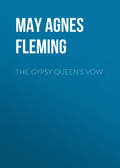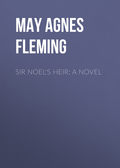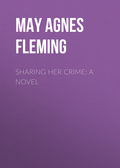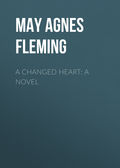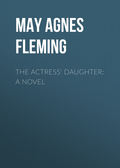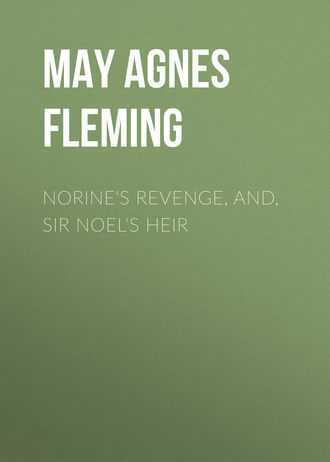
May Agnes Fleming
Norine's Revenge, and, Sir Noel's Heir
CHAPTER XIV.
PARTED
Half an hour had passed.
Up and down the long drawing-room Aileen wandered, aimlessly, restlessly, oppressed with an overwhelming dread of, she knew not what, a prescience of evil, vague as it was terrible. The dark gloom of the rainy evening was not darker than that brooding shadow in her deep, dusky eyes.
In the library Colonel Jocyln stood facing his son-in-law elect, staring like a man bereft of his senses. The melancholy half light coming wanly through the oriel window by which he stood, fell full upon the face of Rupert Thetford, white and cold, and set as marble.
"My God!" the Indian officer said, with wild eyes of terror and affright, "what is this you are telling me?"
"The truth, Col. Jocyln – the simple truth. Would to Heaven I had known it years ago – this shameful story of wrong-doing and misery!"
"I don't comprehend – I can't comprehend this impossible tale, Sir Rupert."
"That is a misnomer now, Colonel Jocyln. I am no longer Sir Rupert."
"Do you mean to say you credit this wild story of a former marriage of Sir Noel's? Do you really believe your late governess to have been your father's wife?"
"I believe it, colonel. I have facts and statements, and dying words to prove it. On my father's death-bed, he made my mother swear to tell the truth, to repair the wrong he had done; to seek out his son, concealed by his valet, Vyking, and restore him to his rights! My mother never kept that promise – the cruel wrong done to herself was too bitter; and at my birth she resolved never to keep it. I should not atone for the sin of my father; his elder son should never deprive her child of his birthright. My poor mother! You know the cause of that mysterious trouble which fell upon her at my father's death, and which darkened her life to the last. Shame, remorse, anger – shame for herself – a wife only in name; remorse for her broken vow to the dead, and anger against that erring dead man."
"But you told me she had hunted him up and provided for him," said the mystified colonel.
"Yes; she saw an advertisement in a London paper, calling upon Vyking to take charge of the boy he had left twelve years before. Now Vyking, the valet, had been transported for house-breaking long before that, and my mother answered the advertisement. There could be no doubt the child was the child Vyking had taken charge of – Sir Noel Thetford's rightful heir. My mother left him with the painter, Legard, with whom he grew up, whose name he took; and he is now at Thetford Towers."
"I thought the likeness meant something," muttered the colonel under his mustache, "his paternity is plainly enough written in his face. And so," raising his voice, "Mrs. Weymore recognized her son. Really, your story runs like a melodrama, where the hero turns out to be a duke, and his mother knows the strawberry mark on his arm. Well, sir, if Mrs. Weymore is Sir Noel's rightful widow, and Guy Legard his rightful son and heir – pray what are you?"
The colorless face of the young man turned dark red for an instant, then whiter than before.
"My mother was as truly and really Sir Noel's wife as woman can be the wife of man in the sight of Heaven. The crime was his; the shame and suffering hers; the atonement mine. Sir Noel's elder son shall be Sir Noel's heir – I will play usurper no longer. To-morrow I leave St. Gosport; the day after England, never perhaps, to return."
"You are mad," Colonel Jocyln said, turning very pale; "you do not mean it."
"I am not mad, and I do mean it. I may be unfortunate; but, I pray God, never a villain. Right is right; my brother Guy is the rightful heir – not I."
"And Aileen?" Colonel Jocyln's face turned dark and rigid as iron as he spoke his daughter's name.
Rupert Thetford turned away his changing face.
"It shall be as she says. Aileen is too noble and just herself not to honor me for doing right."
"It shall be as I say," returned Colonel Jocyln, with a voice that rang, and an eye that flashed. "My daughter comes of a proud and stainless race, and never shall she mate with one less stainless. Hear me out, young man. It won't do to fire up – plain words are best suited to a plain case. All that has passed between you and Miss Jocyln must be as if it had never been. The heir of Thetford Towers, honorably born, I consented she should marry; but, dearly as I love her, I would see her dead at my feet before she should marry one who was nameless and impoverished. You said just now the atonement was yours – you said right; go, and never return."
He pointed to the door; the young man, stonily still, took his hat.
"Will you not permit your daughter, Colonel Jocyln, to speak for herself?" he said at the door.
"No, sir. I know my daughter – my proud, high-spirited Aileen, and my answer is hers. I wish you good-night."
He swung round abruptly, turning his back upon his visitor. Rupert Thetford, without one word, turned and walked out of the house.
The bewildering rapidity of the shocks he had received had stunned him – he could not feel the pain now. There was a dull sense of aching torture upon him from head to foot – but the acute edge was dulled; he walked along through the black night like a man drugged and stupefied.
He was only conscious intensely of one thing – a wish to get away, never to set foot in St. Gosport again.
Like one walking in his sleep, he reached Thetford Towers, his old home, every tree and stone of which was dear to him. He entered at once, passed into the drawing-room, and found Guy Legard, sitting before the fire, staring blankly into the coals; and May Everard, roaming restlessly up and down, the firelight falling dully on her black robes and pale, tear-stained face. Both started at his entrance – all wet, and pale and haggard; but neither spoke. There was that in his face which froze the words on their lips.
"I am going away to-morrow," he said, abruptly, leaning against the mantel, and looking at them with quiet, steadfast eyes.
May uttered a faint cry; Guy faced him almost fiercely.
"Going away! What do you mean, Sir Rupert? We are going away together, if you like."
"No; I go alone. You remain here, it is your place now."
"Never!" cried the young artist, passionately – "never! I will go out and die like a dog, of starvation, before I rob you of your birthright!"
"You reverse matters," said Rupert Thetford; "it is I who have robbed you, unwittingly, for too many years. I promised my mother on her death-bed, as she promised my father on his, that you should have your right, and I will keep that promise. Guy, dear old fellow! don't let us quarrel, now that we are brothers, after being friends so long. Take what is your own; the world is all before me, and surely I am man enough to win my own way. Not one other word; you shall not come with me; you might as well talk to these stone walls and try to move them as to move me. To-morrow I go, and go alone."
"Alone!" It was May who breathlessly repeated the word.
"Alone; all the ties that bound me here are broken; I go alone, and single-handed, to fight the battle of life Guy, I have spoken to the rector about you – you will find him your friend and aider; and May is to make her home at the rectory. And now," turning suddenly, and moving to the door, "as I start early to-morrow, I believe I'll retire early. Good-night."
And then he was gone, and Guy and May were left staring at each other with blank faces.
The storm of wind and rain sobbed itself out before midnight; and in the bluest of skies, heralded by banners of rosy clouds, rose up the sun next morning. Before that rising sun had gilded the tops of the tallest oaks in the park, he, who had so lately called it all his own, had opened the heavy oaken door and passed from Thetford Towers, as home, forever. The house was very still – no one had risen; he had left a note to Guy, with a few brief, warm words of farewell.
"Better so," he thought – "better so! He and May will be happy together, for I know he loves her, and she him. The memory of my leave-taking shall never come to cloud their united lives."
One last backward glance at the eastern windows turning to gold; at the sea blushing in the first glance of the day-king; at the waving trees and swelling meadows, and gray, old ivy-grown front, and then he passed down the avenue, out through the massive entrance-gates, and was gone.
CHAPTER XV.
AFTER FIVE YEARS
Moonlight falling like a silvery veil over Venice – a crystal clear crescent in a purple sky shimmering on palace and prison, churches, squares and canals, on the gilded gondolas, and the flitting forms passing like noiseless shadows to and fro.
A young lady leaned from a window of a vast Venetian hotel, gazing thoughtfully at the silver-lighted landscape, so strange, so unreal, so dream-like, to her unaccustomed eyes. A young lady, stately and tall, with a pale, proud face, deep, dark eyes, solemn, shining, fathomless, like mountain tarns; floating dark ringlets and a statuesque sort of beauty that was perfect in its way. She was dressed in trailing robes of crape and bombazine, and the face, turned to the moonlight, was cold and still.
She turned her eyes from the moonlit canal, down which dark gondolas floated to the music of the gay gondolier's song; once, as an English voice in the piazza below, sung a stave of a jingling barcarole,
"Oh, gay we row where full tides flow
And bear our bounding pinnace;
And leap along where song meets song,
Across the waves of Venice."
The singer, a tall young man, with a florid face, and yellow side whiskers, an unmistakable son of the "right little, tight little" island, paused in his song, as another man, stepping through an open window, struck him an airy sledge-hammer slap on the back.
"I ought to know that voice," said the last comer.
"Mortimer, my lad, how goes it?"
"Stafford!" cried the singer, seizing the outstretched hand in a genuine English grip, "happy to meet you, old boy, in the land of romance! La Fabre told me you were coming – but who would look for you so soon? I thought you were doing Sorrento?"
"Got tired of Sorrento," said Stafford, taking his arm for a walk up and down the piazza; "there's a fever there, too – quite an epidemic – malignant typhus. Discretion is the better part of valor, where Sorrento fevers are concerned. I left."
"When did you reach Venice?" asked Mortimer, lighting a cigar.
"An hour ago; and now who's here? Any one I know?"
"Lots. The Cholmonadeys, the Lythons, the Howards, of Leighwood; and, by-the-by, they have with them the Marble Bride."
"The which?" asked Mr. Stafford.
"The Marble Bride, the Princess Frostina, otherwise Miss Aileen Jocyln, of Jocyln Hall, Devonshire. You knew the old colonel, I think – he died over a year ago, you remember."
"Ah, yes! I remember. Is she here with the Howards, and as handsome as ever, no doubt?"
"Handsome to my mind, with an uplifted and unapproachable sort of beauty. A fellow might as soon love some bright particular star, etc., as the fabulously wealthy heiress of all the Jocylns. She has no end of suitors – all the best men here bow at the shrine of the ice-cold Aileen, and all in vain."
"You among the rest, my friend?" with a light laugh.
"No, by Jove!" cried Mr. Mortimer; "that sort of thing, the marble style, you know, never was to my taste. I admire Miss Jocyln immensely; just as I do that moon up there, with no particular desire ever to get nearer."
"What was that story I heard once, five years ago, about a broken engagement? Wasn't Thetford of that ilk hero of the tale? The romantic Thetford, who resigned his title and estate to a mysteriously-found elder brother, you know. The story rang through the papers and the clubs at the time like wildfire, and set the whole country talking, I remember. She was engaged to him, wasn't she, and broke off?"
"So goes the story – but who knows? I recollect that odd affair perfectly well; it was like the melo-dramas on the Surrey side of the Thames. I know the 'mysteriously found elder brother,' too – very fine fellow, Sir Guy Thetford, and married to the prettiest little wife the sun shines on. I must say Rupert Thetford behaved wonderfully well in that unpleasant business; very few men would do as he did – they would, at least, have made a fight for the title and estates. By-the-way, I wonder what ever became of him?"
"I left him at Sorrento," said Stafford, coolly.
"The deuce you did! What was he doing there?"
"Raving in the fever; so the people told me with whom he stopped. I just discovered he was in the place as I was about to leave it. He had fallen very low, I fancy; his pictures didn't sell, I suppose; he has been in the painting line since he ceased to be Sir Rupert, and the world has gone against him. Rather hard on him to lose fortune, title, home, bride, and all at one fell swoop."
"And so you left him ill of the fever? Poor fellow!"
"Dangerously ill."
"And the people with whom he is will take very little care of him. He's as good as dead. Let us go in – I want to have a look at the latest English papers."
The two men passed in, out of the moonlight, off the piazza, all unconscious that they had had a listener. The pale watcher in the trailing black robes scarcely heeding them at first, had grown more and more absorbed in the careless conversation. She caught her breath quick and hard, the dark eyes dilated, the slender hands pressed tight over the throbbing heart. As they went in off the balcony, she slid from her seat and held up her clasped hands to the luminous night sky.
"Here me, O God!" the white lips cried. "I, who have aided in wrecking a noble heart, hear me, and help me to keep my vow! I offer my whole life in atonement for the cruel and wicked past. If he dies, I shall go to my grave his unwedded widow. If he lives – "
Her voice faltered and died out, her face dropped forward on the window-sill, and the moonlight fell like a benediction on the bowed young head.
CHAPTER XVI.
AT SORRENTO
The low light in the western sky was fading out; the bay of Naples lay rosy in the haze of the dying day; the soft, sweet wind floated over the waters; the fishing boats were coming in; and on this scene an invalid, looking from a window high up on the sea-washed cliff of Sorrento, gazed languidly.
For he was surely an invalid who sat in that window chair and gazed at the wondrous Italian sea, and that lovely Italian sky. Surely an invalid, with that pallid face, those spectral, hollow eyes, those sunken cheeks, those bloodless lips; surely an invalid, and one but very lately risen from the very gates of death, a pale shadow, worn and weak as a child.
As he sits there, where he has sat for hours, lonely and alone, the door opens, and an English face looks in – the face of an Englishman of the lower classes.
"A visitor for you, sir – just come, and a-foot; a lady, sir. She will not give her name, but wishes to see you most particular, if you please."
"A lady! To see me?"
The invalid opens his dark eyes in wonder as he speaks.
"Yes, sir; an English lady, sir, dressed in black, and a wearing of a thick veil. She asked for Mr. Rupert Thetford as soon as she see me, as plain, as plain, sir – "
The young man in the chair started, half rose, and then sunk back; an eager light lit in the hollow eyes.
"Let her come in, I will see her."
The man disappeared; there was an instant's pause, then a tall, slender figure, draped and veiled in black, entered alone.
The visitor stood still. Once more the invalid attempted to rise, once more his strength failed him. The lady threw back her veil with a sudden emotion.
"My God, Aileen!"
"Rupert!"
She was on her knees before him, lifting her suppliant hands.
"Forgive me! forgive me! I have seemed the most heartless and cruel of women. But I too, have suffered. I am base and unworthy; but, oh! forgive me, if you can."
The old love, stronger then death, shone in her eyes, plead in her passionate, sobbing voice, and went to his very heart.
"I have been so wretched, so wretched all these miserable years. While my father lived, I would not disobey his stern command, that I was never to attempt to see or hear from you, and at his death I could not. You seemed lost to me and to the world. Only by the merest accident I heard in Venice you were here, and ill – dying. I lost no time; I came hither at once, hoping against hope to find you alive. Thank God I did come. O Rupert! for the sake of the past forgive me."
"Forgive you!" and he tried to raise her. "Aileen – darling!"
His weak arms encircled her, and the pale lips pressed passionate kisses on the tear-wet face.
So while the glory of the sunset lay on the sea, and until the stars spangled the sky, the reunited lovers sat in the soft haze, as Adam and Eve may have sat in the loveliness of Eden.
"How long since you left England?" Rupert asked, at length.
"Two years ago; poor papa died in the South of France – you mustn't blame him too much, Rupert."
"My dearest, we will talk of blaming no one. And Guy and May are married? I knew they would be."
"Did you? I was so surprised when I read it in the Times; for you know May and I never corresponded – she was frantically angry with me. Do they know you are here?"
"No, I rarely write, and I am constantly moving about; but I know that Guy is very much beloved in St. Gosport. We will go back to England, one of these days, my darling, and give them the greatest surprise they have received since Guy Thetford learned who he really was."
He smiled as he said it – the old bright smile she remembered so well. Tears of joy filled the beautiful upturned eyes.
"And you will go back? O Rupert! it needed but this to complete my happiness."
He drew her closer, and then there was a long delicious silence, while they watched together the late-rising moon climbing the misty hills above Castellamare.
CHAPTER XVII.
AT HOME
Another sunset, red and gorgeous, over swelling English meadows, waving trees, and grassy terrace, lighting up with its crimson radiance the gray forest of Thetford Towers.
In the pretty, airy summer drawing-room, this red sunset streams through open western windows, kindling everything into living light. It falls on the bright-haired girlish figure, dressed in floating white, seated in an arm-chair in the centre of the room, too childish-looking, you might fancy, at first sight, to be mamma to that fat baby she holds in her lap; but she is not a bit too childish. And that is papa, tall and handsome, and happy, who leans over the chair and looks as men do look on what is the apple of their eye, and the pride of their heart.
"It's high time baby was christened, Guy," Lady Thetford – for, of course, Lady Thetford it is – was saying; "and, do you know, I am really at a loss for a name. You won't let me call him Guy, and I sha'n't call him Noel – and so what is it to be?"
"Rupert, of course," Sir Guy suggests; and little Lady Thetford pouts.
"He does not deserve the compliment. Shabby fellow! To keep wandering about the world as he does, and never to answer one's letters; and I sent him half a ream last time, if I sent him a sheet, telling all about baby, and asking him to come and be godfather, and coaxing him with the eloquence of a female Demos – , the man in the tub you know. And to think it should be all of no use! To think of not receiving a line in return. It is using me shamefully; and I don't believe I will call baby Rupert."
"Oh, yes you will, my dear! Well, Smithers, what is it?"
For Mr. Smithers, the butler, stood in the doorway, with a very pale and startled face.
"It's a gentleman – leastways a lady – leastways a lady and gentleman. Oh! here they come theirselves!"
Mr. Smithers retired precipitately, still pale and startled of visage, as a gentleman, with a lady on his arm, stood before Sir Guy and Lady Thetford.
There was a half shout from the young baronet, a wild shriek from the young lady. She sprung to her feet, and nearly dropped the precious baby.
"Rupert! Aileen!"
She never got any further – this impetuous little Lady Thetford, for she was kissing first one, then the other, crying and laughing, and talking all in a breath.
"Oh! what a surprise this is! Rupert my dear, my dear, I'm so glad to see you again! O Aileen! I never, never hoped for this! Guy, O Guy, to think it should all come right at last!"
But Guy was wringing his brother's hand, with bright tears standing in his eyes, and quite unable to reply.
"And this is the baby, May? The wonderful baby you wrote me so much about," Mr. Rupert Thetford said. "A noble little fellow, upon my word; and a Thetford from top to toe. Am I in season to be godfather?"
"Just in season. The name was to have been Rupert in any case, but a moment ago I was scolding frightfully, because you had not answered my letter, little dreaming you were coming to answer in person. And Aileen too! Oh! my dear, my dear, sit down at once and tell me all about it."
Mrs. Thetford smiles at the old impetuosity, and in very few words tells the story of the meeting and the marriage.
"Of course you remain in England?" Sir Guy eagerly asked, when he had heard the brief résumé of those past five years. "Of course Jocyln Hall is to be headquarters and home?"
"Yes," Rupert says, his eyes for a moment lingering lovingly on his wife, "Jocyln Hall is home. We have not yet been there; we came at once here to see the most wonderful baby of modern times – my handsome little namesake."
"It is just like a fairy tale," is all Lady Thetford can say then; but late that night, when the reunited friends were in their chambers, she lifted her golden head off the pillow, and looked at her husband entering the room. "It's so very odd, Guy," slowly and drowsily, "to think that, after all, a Rupert Thetford should be Sir Noel's Heir."



